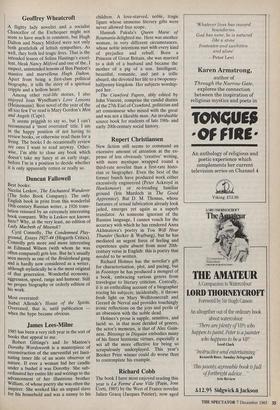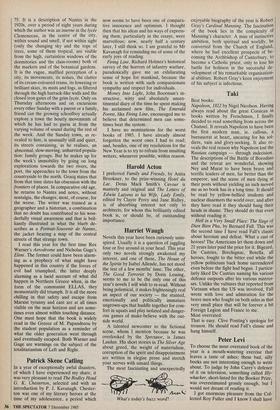Richard Cobb
The book I have most enjoyed reading this year is La Forme d'une Ville (Paris, Jose Corti, 1985) by the West of France novelist Julien Gracq (Jacques Poirier), now aged 75. It is a description of Nantes in the 1920s, over a period of eight years during which the author was an interne in the lycee Clemenceau, in the centre of the city, within sound and smell, if not within sight (only the changing sky and the tops of trees, some of them tropical, are visible from the high, curtainless windows of the dormitories and the class-rooms) both of the markets and of the botanical gardens. It is the vague, muffled perception of a city, its movements, its noises, the clatter of its cream-coloured trams, its lowering or brilliant skies, its mists and fogs, as filtered through the high barrack-like walls and the closed iron gates of the grim /ycee. Only on Thursday afternoons and on excursions every other Sunday with a parent or a family, friend can the growing schoolboy actually explore a town the hourly movements of which he has had to guess at from the varying volume of sound during the rest of the week. And the Sunday town, as re- vealed to him, is unusually still and quiet, its streets containing, as he realises, an abnormal, slow-moving, unhurried popula- tion: family groups. But he makes up for the week's immobility by going on long explorations towards the two rivers, the port, the approaches to the town from the countryside to the north. Gracq states that from that time dates his obsession with the frontiers of places. In comparative old age, he returns to Nantes and notes, without nostalgia, the changes, most, of course, for the worse. The writer was trained as a geographer and a historian, a combination that no doubt has contributed to his won- derfully visual awareness and that is bril- liantly illustrated in what the blurb de- scribes as a Portrait-Souvenir de Nantes, the jacket bearing a map of the central streets of that strange town.
I read this year for the first time Rex Warner's Aerodrome and Nicholas Gage's Eleni. The former could have been alarm- ing as a prophecy of what might have happened in this country if the forces of evil had triumphed, the latter deeply alarming as a lucid account of what did happen in Northern Greece when, in the form of the communist ELLAS, they momentarily did triumph. It is all the more chilling in that safety and escape from Marxist tyranny and cant are at all times visible on the near horizon and are some- times even almost within touching distance. One must hope that the book is widely read in the Greece of M. Papandreou by the student population as a reminder of what the older generation went through and eventually escaped. Both Warner and Gage are warnings on the subject of the totalitarianism of Left and Right.



































































 Previous page
Previous page